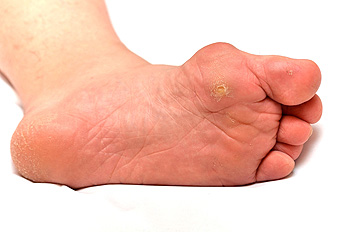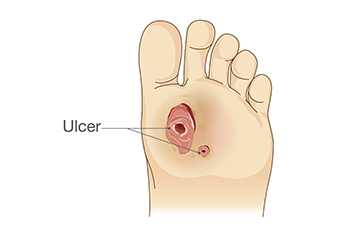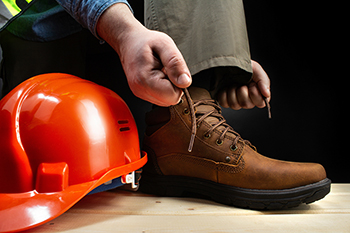December 2023
Heel Pain Can Be Treated!
Factors in Choosing Walking Shoes

Choosing the right walking shoes is essential for ensuring a comfortable and enjoyable walking experience. To find the perfect pair of walking shoes, start by determining where you plan to walk, whether it involves avid treks or easy strolls with your dogs on a short woodland path. Prioritize comfort, looking for shoes with a cushioned heel collar, insole, and midsole to maximize comfort during every step. Additionally, opt for shoes that provide flexibility, allowing your toes to move naturally and ensuring a smooth and steady walking motion. Consider the materials used in the shoes. Synthetic materials, often lighter in weight, provide durability without compromising performance during long walks. If you have wide feet, choose shoes with a larger toe box to prevent discomfort and allow ample room for natural toe movement. Check for sufficient arch support in the midsole to protect and support your feet during walks. Choose lightweight shoes to avoid fatigue and enhance endurance during long walks. Lastly, evaluate whether you need waterproof materials based on expected weather conditions. If you need help in navigating the various factors involved in selecting the right walking shoe, it is suggested that you schedule an appointment with a podiatrist for a gait analysis, foot exam, and expert advice.
It is important to find shoes that fit you properly in order to avoid a variety of different foot problems. For more information about treatment, contact Naim G. Shaheed, DPM from Ankle and Foot Centers of Georgia. Our doctor will treat your foot and ankle needs.
Proper Shoe Fitting
Shoes have many different functions. They cushion our body weight, protect our feet, and allow us to safely play sports. You should always make sure that the shoes you wear fit you properly in order to avoid injuries and deformities such as: bunions, corns, calluses, hammertoes, plantar fasciitis, stress fractures, and more. It is important to note that although a certain pair of shoes might be a great fit for someone else, that doesn’t mean they will be a great fit for you. This is why you should always try on shoes before buying them to make sure they are worth the investment. Typically, shoes need to be replaced ever six months to one year of regular use.
Tips for Proper Shoe Fitting
- Select a shoe that is shaped like your foot
- Don’t buy shoes that fit too tight, expecting them to stretch to fit
- Make sure there is enough space (3/8” to ½”) for your longest toe at the end of each shoe when you are standing up
- Walk in the shoes to make sure they fit and feel right
- Don’t select shoes by the size marked inside the shoe, but by how the shoe fits your foot
The shoes you buy should always feel as good as they look. Shoes that fit properly will last longer, feel better, and improve your way of life each day.
If you have any questions, please feel free to contact one of our offices located in Lithonia/Stonecrest and Emory/Midtown, GA . We offer the newest diagnostic and treatment technologies for all your foot care needs.
Causes of Corns on the Feet

Foot corns are thickened patches of skin that form due to friction and pressure. Common symptoms can include rough, yellowish, sensitive skin on the toes, which can be painful when wearing shoes. Corns can develop in various areas of the feet, including below the toenails, between the toes, on the sides of the foot, and on the soles. Wearing tight shoes or standing for extended periods of time may cause corns to develop. If you have persistent or worrying foot corns, it is suggested that you schedule an appointment with a podiatrist for professional removal, which may involve scraping, shaving, or cutting the corn layers over multiple appointments.
Corns can make walking very painful and should be treated immediately. If you have questions regarding your feet and ankles, contact Naim G. Shaheed, DPM of Ankle and Foot Centers of Georgia. Our doctor will treat your foot and ankle needs.
Corns: What Are They? And How Do You Get Rid of Them?
Corns are thickened areas on the skin that can become painful. They are caused by excessive pressure and friction on the skin. Corns press into the deeper layers of the skin and are usually round in shape.
Ways to Prevent Corns
There are many ways to get rid of painful corns such as:
- Wearing properly fitting shoes that have been measured by a professional
- Wearing shoes that are not sharply pointed or have high heels
- Wearing only shoes that offer support
Treating Corns
Although most corns slowly disappear when the friction or pressure stops, this isn’t always the case. Consult with your podiatrist to determine the best treatment option for your case of corns.
If you have any questions please feel free to contact one of our offices located in Lithonia/Stonecrest and Emory/Midtown, GA . We offer the newest diagnostic and treatment technologies for all your foot and ankle needs.
Different Types of Diabetic Foot Ulcers

Diabetic foot ulcers, a major complication for individuals with diabetes, vary based on depth, infection, and location. They are primarily categorized into neuropathic, ischemic, and neuroischemic ulcers. Neuropathic ulcers occur due to nerve damage, resulting in loss of sensation in the feet. Patients may not feel minor injuries, leading to ulcers, generally located under the foot's high-pressure areas. Ischemic ulcers stem from poor blood circulation, often associated with peripheral arterial disease. They can appear anywhere on the foot but are typically found in areas with poor blood supply. Neuroischemic ulcers combine the features of both neuropathic and ischemic ulcers, presenting a blend of circulation issues and nerve damage. These are the most common and challenging to treat, as they are prone to infection and slow healing. If you are diabetic and have foot problems, it is strongly suggested that you schedule regular appointments with a podiatrist to have your feet properly examined and ensure that any brewing issues, such as foot ulcers, are treated promptly.
Diabetic foot care is important in preventing foot ailments such as ulcers. If you are suffering from diabetes or have any other concerns about your feet, contact Naim G. Shaheed, DPM from Ankle and Foot Centers of Georgia. Our doctor can provide the care you need to keep you pain-free and on your feet.
Diabetic Foot Care
Diabetes affects millions of people every year. The condition can damage blood vessels in many parts of the body, especially the feet. Because of this, taking care of your feet is essential if you have diabetes, and having a podiatrist help monitor your foot health is highly recommended.
The Importance of Caring for Your Feet
- Routinely inspect your feet for bruises or sores.
- Wear socks that fit your feet comfortably.
- Wear comfortable shoes that provide adequate support.
Patients with diabetes should have their doctor monitor their blood levels, as blood sugar levels play such a huge role in diabetic care. Monitoring these levels on a regular basis is highly advised.
It is always best to inform your healthcare professional of any concerns you may have regarding your feet, especially for diabetic patients. Early treatment and routine foot examinations are keys to maintaining proper health, especially because severe complications can arise if proper treatment is not applied.
If you have any questions please feel free to contact one of our offices located in Lithonia/Stonecrest and Emory/Midtown, GA . We offer the newest diagnostic and treatment technologies for all your foot and ankle needs.
The Important Role of Foot Protection at Work

In the realm of occupational safety, the significance of foot protection while working cannot be overstated. Whether navigating construction sites, industrial settings, or healthcare environments, the feet are vulnerable to various hazards. Sturdy, well-designed work boots serve as the first line of defense against potential injuries. These boots are crafted to shield the feet from falling objects, electrical hazards, sharp objects, and chemical spills. In professions where standing for prolonged periods is common, the right footwear provides essential support, preventing fatigue and discomfort. Beyond physical protection, appropriate footwear promotes overall foot health by reducing the risk of conditions like plantar fasciitis and stress fractures. Recognizing the role of foot protection in the workplace emphasizes the need for employers and employees alike to prioritize the selection and maintenance of proper footwear. If you would like more information about specific foot protection during the workday, it is suggested that you speak to a podiatrist.
While working on the feet, it is important to take the proper care of them. For more information about working on your feet, contact Naim G. Shaheed, DPM from Ankle and Foot Centers of Georgia. Our doctor will treat your foot and ankle needs.
Working on Your Feet
Standing on your feet for long periods of time can cause stress and pain in your feet. Your whole body may experience change in terms of posture, back pain, bunions, callouses and or plantar warts. There are ways to avoid these conditions with proper foot care, smart choices and correct posture.
Positive Changes
Negative heeled shoe – Choosing this shoe type places the heel slightly lower than the ball of the foot. These are great for overall foot health. Find shoes that fit you correctly.
Go barefoot – Our feet were not designed to be enclosed for all hours of the day. Try to periodically expose your feet to air.
Eliminate Pain
Foot Exercises – Performing simple exercises, incorporating yoga and doing stretches are beneficial. This will allow increased blood flow to the area and muscles of the foot.
Achilles tendon – Stretching the foot out flat on the floor will relax the calf muscles and tendon. These exercises can be performed almost anywhere. Make sure you add these exercises to your daily regimen.
With a little bit of this information and knowing more about foot health, you will notice changes. Foot stretches and proper footwear will help with pain and prevent further issues.
If you have any questions please feel free to contact one of our offices located in Lithonia/Stonecrest and Emory/Midtown, GA . We offer the newest diagnostic and treatment technologies for all your foot and ankle needs.










